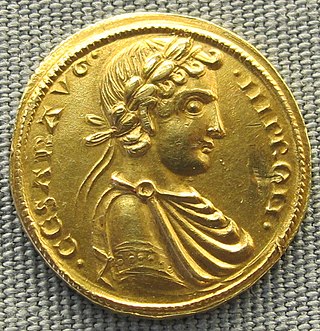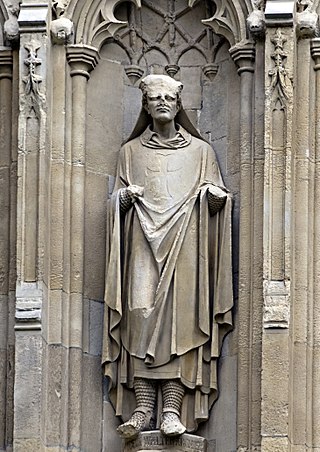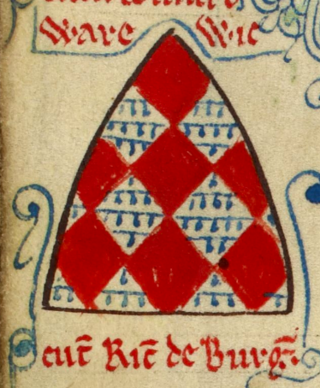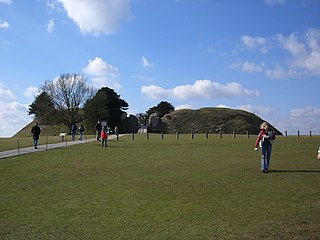Related Research Articles

Year 1194 (MCXCIV) was a common year starting on Saturday of the Julian calendar.
A coroner is a government or judicial official who is empowered to conduct or order an inquest into the manner or cause of death, and to investigate or confirm the identity of an unknown person who has been found dead within the coroner's jurisdiction.

Hubert Walter was an influential royal adviser in the late twelfth and early thirteenth centuries in the positions of Chief Justiciar of England, Archbishop of Canterbury, and Lord Chancellor. As chancellor, Walter began the keeping of the Charter Roll, a record of all charters issued by the chancery. Walter was not noted for his holiness in life or learning, but historians have judged him one of the most outstanding government ministers in English history.
Eustace was the twenty-third Lord Chancellor of England, from 1197 to 1198. He was also Dean of Salisbury and Bishop of Ely.

Walter de Coutances was a medieval Anglo-Norman bishop of Lincoln and archbishop of Rouen. He began his royal service in the government of Henry II, serving as a vice-chancellor. He also accumulated a number of ecclesiastical offices, becoming successively canon of Rouen Cathedral, treasurer of Rouen, and archdeacon of Oxford. King Henry sent him on a number of diplomatic missions and finally rewarded him with the bishopric of Lincoln in 1183. He did not remain there long, for he was translated to Rouen in late 1184.

Richard Mór de Burgh, 1st Lord of Connacht, was a Hiberno-Norman aristocrat who was Seneschal of Munster and Justiciar of Ireland (1228–32).
The Coroner of the King's/Queen's Household was an office of the Medical Household of the Royal Household of the Sovereign of the United Kingdom. It was abolished in 2013.
The Crowner John Mysteries are a series of novels by Bernard Knight following the fictional life of Sir John de Wolfe, a former Crusading knight appointed to the office of Keeper of the Pleas of the King's Crown, i.e. the King's Crowner or Coroner, for the county of Devon.
Walter Mauclerk was a medieval Bishop of Carlisle and Lord High Treasurer of England.
Henry Marshal was a medieval Bishop of Exeter. He was a member of the Marshal family.
Events from the 1190s in England.
Carucage was a medieval English land tax enacted by King Richard I in 1194, based on the size—variously calculated—of the taxpayer's estate. It was a replacement for the danegeld, last imposed in 1162, which had become difficult to collect because of an increasing number of exemptions. Carucage was levied just six times: by Richard in 1194 and 1198; by John, his brother and successor, in 1200; and by John's son, Henry III, in 1217, 1220, and 1224, after which it was replaced by taxes on income and personal property.
Simon of Pattishall was an English judge and civil servant who is considered the first Chief Justice of the Common Pleas.
An eyre or iter, sometimes called a general eyre, was the name of a circuit travelled by an itinerant justice in medieval England, or the circuit court over which they presided, or the right of the monarch to visit and inspect the holdings of any vassal. The eyre involved visits and inspections at irregular intervals of the houses of vassals in the kingdom. The term is derived from Old French erre, from Latin iter ("journey"), and is cognate with errand and errant. Eyres were also held in those parts of Ireland under secure English rule from about 1220 onwards, but the eyre system seems to have largely gone into abeyance in Ireland at the end of the thirteenth century, and the last Irish eyre was held in 1322.

The courts of assize, or assizes, were periodic courts held around England and Wales until 1972, when together with the quarter sessions they were abolished by the Courts Act 1971 and replaced by a single permanent Crown Court. The assizes exercised both civil and criminal jurisdiction, though most of their work was on the criminal side. The assizes heard the most serious cases, most notably those subject to capital punishment or later life imprisonment. Other serious cases were dealt with by the quarter sessions, while the more minor offences were dealt with summarily by justices of the peace in petty sessions.
The Exchequer of the Jews was a division of the Court of Exchequer at Westminster which recorded and regulated the taxes and the law-cases of the Jews in England and Wales. It operated from the late 1190s until the eventual expulsion of the Jews in 1290.

Hugh Bardulf or Hugh Bardolf was a medieval English administrator and royal justice. Known for his legal expertise, he also served as a financial administrator. He served three kings of England before his death.
Gervase de Cornhill was an Anglo-Norman royal official and sheriff. Beginning his royal service as a justice in London in 1147, he continued to serve both King Stephen of England and Henry II until his death around 1183. He played a minor role in the Becket controversy in 1170.
Osbert fitzHervey was an Anglo-Norman royal judge. Brother of Hubert Walter and Theobald Walter, Osbert served three kings of England and may have contributed to the legal treatise attributed to his uncle, Ranulf de Glanvill. Ralph of Coggeshall, a medieval writer, praised Osbert's knowledge of law, but condemned his acceptance of gifts from plaintiffs and defendants in legal cases. Osbert was one of a group of men who are considered the first signs of a professional judiciary in England.
William de Warenne, the feudal baron of Wormegay, served as a royal justice under King Richard I and his brother King John. Warenne also served in financial matters, being one of those responsible for collecting taxes and later overseeing debts from Christians to Jews. His career was closely tied to that of Hubert Walter, who employed Warenne as a judge in some ecclesiastical matters. He also founded a priory and gave other gifts to religious houses. The historian Ralph V. Turner said of Warenne that "although he was a longtime official under King John, he did not quite fit into the inner corps of royal counselors".
References
- Churchill, Winston S. (1956). History of the English Speaking Peoples. Vol. 1.